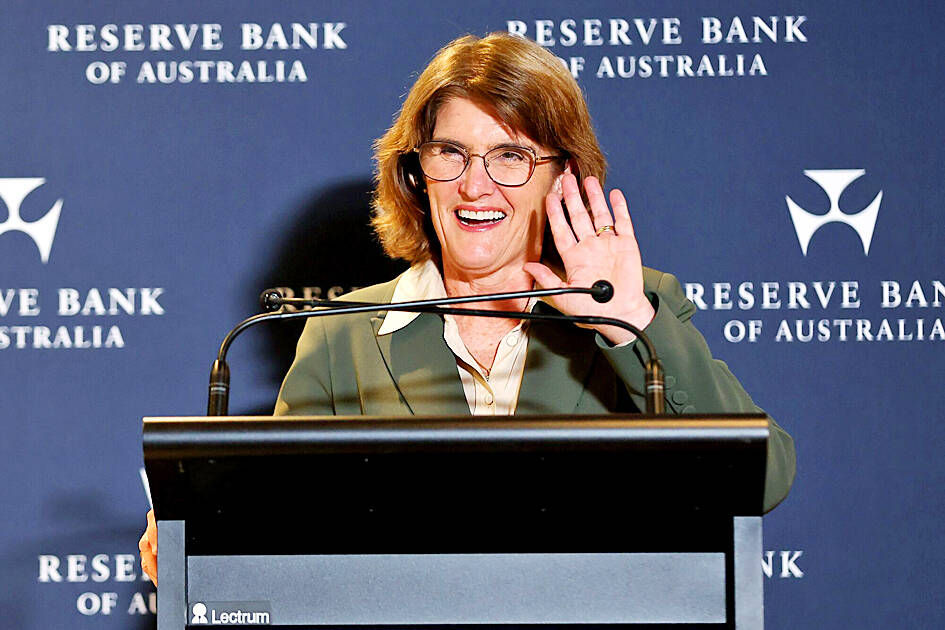Australia’s central bank yesterday signaled that it would keep its key interest rate at a 12-year high in the near term as it struggles with stubborn inflation that is keeping the country from joining a global easing cycle.
“Based on what we know at the moment rates will remain on hold for the time being,” Reserve Bank of Australia (RBA) Governor Michele Bullock told a news conference in Sydney after keeping the cash interest rate at 4.35 percent for a seventh straight meeting.
Still, the bank is not “ruling anything in or out” on policy, Bullock said.

Photo: Bloomberg
Unlike last month, when policymakers put a rate rise on the table, this time around a hike was not “explicitly considered,” Bullock told reporters.
The central bank is focused on returning inflation sustainably to its 2-to-3 percent target, she said.
The bank is facing increasing pressures at home to lower borrowing costs, with politicians sparring over the outlook on interest rates ahead of an election due by May next year.
Bullock said that the central bank would not be dragged into politics.
Its communication yesterday highlights its outlier status compared with peers. Last week, US Federal Reserve Chairman Jerome Powell led his colleagues to an outsize rate cut designed to preserve the strength of the US economy.
Bullock acknowledged the divergence, saying that other central banks had moved into more restrictive territory than Australia.
Economists generally expect rate cuts in Australia to begin in February next year.
Bullock has repeatedly pushed back against talk of near-term easing, reflecting forecasts that inflation would only return to the RBA’s target range late next year.
That has brought her into the political firing line from members of the ruling Labor party and minority parties that are pushing for a rate cut.
At 3.9 percent, Australia’s core prices remain well above target, driven largely by non-discretionary spending such as insurance, education and housing. The job market remains in good shape with unemployment at 4.2 percent.
Monthly data set to be released today are expected to show that inflation has fallen back within the RBA’s band for the first time since August 2021, reflecting the impact of government energy subsidies and other measures.
Bullock said the board wants to be confident that price growth is moving sustainably back toward the bank’s goal, not just moving in and out.
The RBA’s resistance to easing combined with political jockeying over a pending reform of its board structure has spurred domestic criticism of the bank.
The Greens party is demanding the government use its reserve powers to order the RBA to cut rates as a condition for supporting legislation that would split the board in two — one for monetary policy and the other for governance. The government dismissed the Greens’ suggestion as “crazy.”

The US dollar was trading at NT$29.7 at 10am today on the Taipei Foreign Exchange, as the New Taiwan dollar gained NT$1.364 from the previous close last week. The NT dollar continued to rise today, after surging 3.07 percent on Friday. After opening at NT$30.91, the NT dollar gained more than NT$1 in just 15 minutes, briefly passing the NT$30 mark. Before the US Department of the Treasury's semi-annual currency report came out, expectations that the NT dollar would keep rising were already building. The NT dollar on Friday closed at NT$31.064, up by NT$0.953 — a 3.07 percent single-day gain. Today,

‘SHORT TERM’: The local currency would likely remain strong in the near term, driven by anticipated US trade pressure, capital inflows and expectations of a US Fed rate cut The US dollar is expected to fall below NT$30 in the near term, as traders anticipate increased pressure from Washington for Taiwan to allow the New Taiwan dollar to appreciate, Cathay United Bank (國泰世華銀行) chief economist Lin Chi-chao (林啟超) said. Following a sharp drop in the greenback against the NT dollar on Friday, Lin told the Central News Agency that the local currency is likely to remain strong in the short term, driven in part by market psychology surrounding anticipated US policy pressure. On Friday, the US dollar fell NT$0.953, or 3.07 percent, closing at NT$31.064 — its lowest level since Jan.

The New Taiwan dollar and Taiwanese stocks surged on signs that trade tensions between the world’s top two economies might start easing and as US tech earnings boosted the outlook of the nation’s semiconductor exports. The NT dollar strengthened as much as 3.8 percent versus the US dollar to 30.815, the biggest intraday gain since January 2011, closing at NT$31.064. The benchmark TAIEX jumped 2.73 percent to outperform the region’s equity gauges. Outlook for global trade improved after China said it is assessing possible trade talks with the US, providing a boost for the nation’s currency and shares. As the NT dollar

The Financial Supervisory Commission (FSC) yesterday met with some of the nation’s largest insurance companies as a skyrocketing New Taiwan dollar piles pressure on their hundreds of billions of dollars in US bond investments. The commission has asked some life insurance firms, among the biggest Asian holders of US debt, to discuss how the rapidly strengthening NT dollar has impacted their operations, people familiar with the matter said. The meeting took place as the NT dollar jumped as much as 5 percent yesterday, its biggest intraday gain in more than three decades. The local currency surged as exporters rushed to